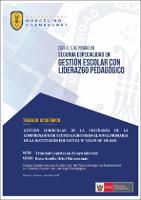Gestión curricular de la enseñanza de la comprensión de textos escritos en el nivel Primaria de la Institución Educativa N° 32429 de Huayo
Fecha
2018Autor(es)
Zelaya Sánchez, Trinidad Capistrano
Metadatos
Mostrar el registro completo del ítemResumen
El presente trabajo académico Gestión curricular para atender los bajos logros de comprensión lectora en el área de comunicación de la Institución Educativa de Educación Primaria N° 32429 de Huayo, distrito de Llata, provincia de Huamaliés; se pretende revertir la problemática diagnosticada con el objetivo general :Mejorar la gestión curricular para atender los bajos logros en comprensión lectora en la IE N° 32429 / Multigrado - Huayo del distrito de Llata- Huamaliés-Huánuco, este estudio de investigación es desarrollado por el director ( con sección a cargo), dos docentes y veintiocho estudiantes de primero a sexto grados. La metodología trabajada y el tipo de investigación es aplicada, de tipo cualitativo, cuyo diseño de Investigación acción participativa, los instrumentos que se usan guía de preguntas orientadoras de la entrevista; esta problemática es originado debido a la falta de compromiso y de capacitación de los docentes, los mismos que repercuten en la calidad de los aprendizajes que imparten a sus estudiantes; la formulación del problema el: ¿Cómo contribuir para mejorar la gestión curricular y atender a los bajos logros en comprensión lectora de la Institución Educativa Multigrado N° 32429 del caserío de Huayo? tiene por propósito el de mejorar los niveles en el logro de la competencia de Comprensión de Textos, se diseñó y aplicó la entrevista en profundidad a una muestra de dos docentes; con la finalidad de identificar su percepción sobre el manejo de estrategias para elevar los niveles de logro en la comprensión de textos de los estudiantes de la I.E. N° 32429 de Huayo-Llata. The present academic work Curricular management to address the low achievements of reading comprehension in the area of communication of the Educational Institution of Primary Education No. 32429 of Huayo, district of Llata, province of Huamaliés; It is intended to reverse the problem diagnosed with the general objective: Improve curricular management to address low achievement in reading comprehension in IE No. 32429 / Multigrade - Huayo of the Llata-Huamaliés-Huánuco district, this research study is developed by the director (with section in charge), two teachers and twenty-eight students from first to sixth grades.
The methodology worked and the type of research is applied, of a qualitative type, whose participatory action research design, the instruments that are used guide the guiding questions of the interview; This problem is caused due to the lack of commitment and training of teachers, the same ones that affect the quality of the learning they impart to their students; The formulation of the problem: How to contribute to improve curricular management and attend to the low achievements in reading comprehension of the Multigrade Educational Institution No. 32429 of the Huayo hamlet? Its purpose is to improve the levels in the achievement of the Text Comprehension competence, the in-depth interview was designed and applied to a sample of two teachers; with the purpose of identifying their perception on the management of strategies to raise the levels of achievement in the comprehension of texts of the students of the I.E. No. 32429 of Huayo-Llata. Among the most outstanding conclusions we have that: The principal as a pedagogical leader is the main person in charge of school management, he is the one who must train effective leaders within the school. Motivated teachers will shape their pedagogical practice in their classroom, thereby improving the learning of their students.
Professional learning communities is a strategy that will allow work at the teacher level, managing to improve educational quality through distributive leadership, collaborative work, and professional development among peers.
It is essential to work with the student on reading comprehension, since this will allow them to read with a critical, reflective sense, to be able to express their opinion about what they have read, thus allowing them to be competent in the society in which they live.


